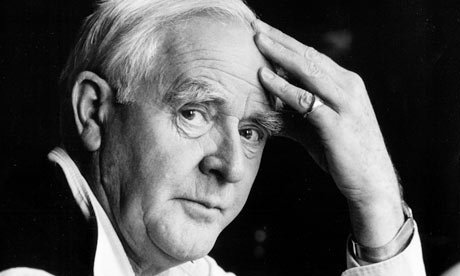Now he was pumped for information which his vestigial loyalty to the service forbade him to speak of, as well as for solutions to mysteries that he knew nothing about. ("Who killed Robert Maxwell?" Rupert Murdoch asked him, suddenly, when they lunched together.) And the public presumed he was at a loss when the cold war ended, with his great preoccupying subject gone. On the contrary, its end delighted him. And history was far from over. The players changed, the game went on. He had focused on the cold war from the 1960s because it was the overriding drama of the age. Others quickly succeeded it: the arms trade ("The Night Manager"), the war on terror ("Absolute Friends"), Big Pharma's misdeeds in Africa ("The Constant Gardener"). Trump's America and Johnson's Britain,
現在他被追問的消息,是他對情報殘存的忠誠所禁止他談論的,以及解決他一無所知的謎團。(“誰殺了羅伯特·麥克斯韋?”魯珀特·默多克突然問他,他們一起吃午飯的時候。)當冷戰結束時,公眾都認為他不知所措,而他那令人費解的話題也消失了。相反,它的結局使他高興。歷史遠未結束。隊員們變了,比賽繼續進行。他從20世紀60年代開始關注冷戰,因為冷戰是這個時代最重要的戲劇。其他人很快就成功了:武器貿易(“夜間經理”)、反恐戰爭(“絕對的朋友”),大型制藥公司在非洲的不當行為(“持續的園丁”)。特朗普的美國和約翰遜的英國,

with their spoon-fed media and nationalistic duping of the public, appalled him equally. Each deserved excoriation in a book in which the characters acted out a global argument, just as the closed society of spies had been, for him, a theatre of the world. So there could be no end to writing, and that, on this gradually clearing morning, was his purpose on the Heath. Notebooks weighed down his pockets; no laptop for him, but the unmechanised thrill of shaping the words with his pen. He had other scribbling places, particularly his seaside house at St Buryan in Cornwall, where no one knew who he was. North London was more difficult, as joggers panted past and trains rattled distantly on the Overground.
他們用勺子喂媒體和民族主義欺騙公眾,同樣令他震驚。在一本書中,每個人都應該受到譴責,書中的人物表現出全球性的爭論,就像封閉的間諜社會對他來說是一個世界劇院一樣。因此,在這個逐漸明朗的早晨,寫作是沒有止境的,這就是他在荒原上的目的。筆記本壓在他的口袋里;他沒有筆記本電腦,只有用筆塑造文字的那種不假思索的興奮。他還有其他涂鴉的地方,特別是他在康沃爾郡圣布里安的海邊房子,沒人知道他是誰。北倫敦則更為困難,慢跑者氣喘吁吁地跑過去,火車在遠處地上嘎嘎作響。
He was making for a particular bench that stood separate from its companions, tucked under a spreading tree. There he worked away. And it seemed to him from time to time, when he looked up, that a figure observed him. Balding, plump, quite unlike him physically, but with the same tendency to want to hide, and the same occasional sharp pain from seeing too much. Even at a distance he could spot him, from the way he thoughtfully cleaned his glasses with the fat end of his tie. A large part of himself, too, had gone to make up Smiley. He was now walking towards him, his lenses gleaming like mirrors.
他要找一條特別的長凳,它和同伴分開站著,藏在一棵蔓延的樹下。他在那里工作。在他看來,每當他抬起頭,一個人影看見了他。禿頂,豐滿,和他身體上很不一樣,但也有想躲起來的傾向,偶爾也會因為看得太多而感到劇痛。即使在遠處他也能認出他,從他若有所思地用領帶那頭擦眼鏡的樣子看。他自己也有很大一部分是去編笑臉的。他正朝他走來,他的鏡片像鏡子一樣閃閃發光。
譯文由可可原創,僅供學習交流使用,未經許可請勿轉載。











